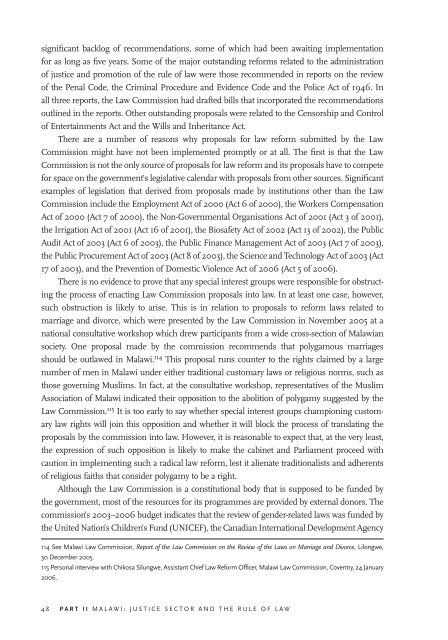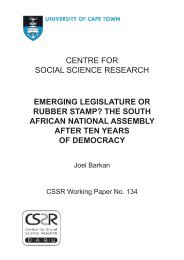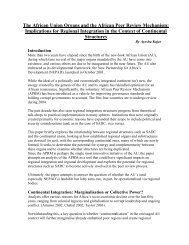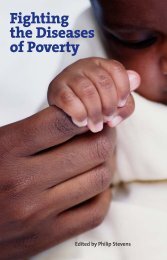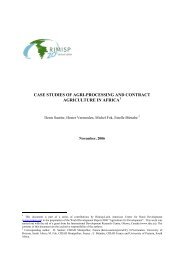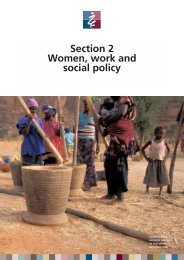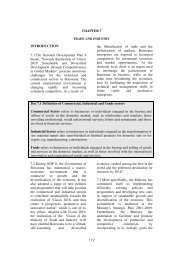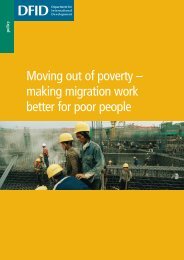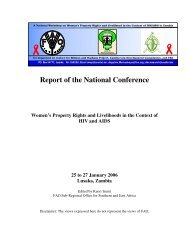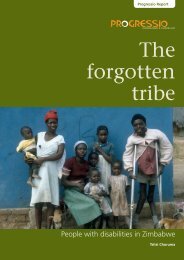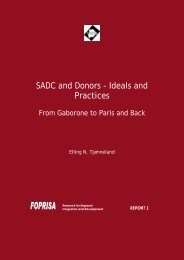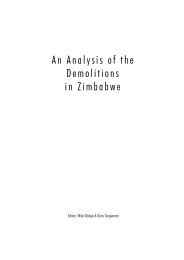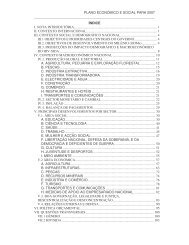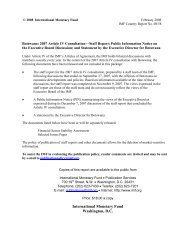Justice Sector and the Rule of Law - AfriMAP
Justice Sector and the Rule of Law - AfriMAP
Justice Sector and the Rule of Law - AfriMAP
You also want an ePaper? Increase the reach of your titles
YUMPU automatically turns print PDFs into web optimized ePapers that Google loves.
significant backlog <strong>of</strong> recommendations, some <strong>of</strong> which had been awaiting implementationfor as long as five years. Some <strong>of</strong> <strong>the</strong> major outst<strong>and</strong>ing reforms related to <strong>the</strong> administration<strong>of</strong> justice <strong>and</strong> promotion <strong>of</strong> <strong>the</strong> rule <strong>of</strong> law were those recommended in reports on <strong>the</strong> review<strong>of</strong> <strong>the</strong> Penal Code, <strong>the</strong> Criminal Procedure <strong>and</strong> Evidence Code <strong>and</strong> <strong>the</strong> Police Act <strong>of</strong> 1946. Inall three reports, <strong>the</strong> <strong>Law</strong> Commission had drafted bills that incorporated <strong>the</strong> recommendationsoutlined in <strong>the</strong> reports. O<strong>the</strong>r outst<strong>and</strong>ing proposals were related to <strong>the</strong> Censorship <strong>and</strong> Control<strong>of</strong> Entertainments Act <strong>and</strong> <strong>the</strong> Wills <strong>and</strong> Inheritance Act.There are a number <strong>of</strong> reasons why proposals for law reform submitted by <strong>the</strong> <strong>Law</strong>Commission might have not been implemented promptly or at all. The first is that <strong>the</strong> <strong>Law</strong>Commission is not <strong>the</strong> only source <strong>of</strong> proposals for law reform <strong>and</strong> its proposals have to competefor space on <strong>the</strong> government’s legislative calendar with proposals from o<strong>the</strong>r sources. Significantexamples <strong>of</strong> legislation that derived from proposals made by institutions o<strong>the</strong>r than <strong>the</strong> <strong>Law</strong>Commission include <strong>the</strong> Employment Act <strong>of</strong> 2000 (Act 6 <strong>of</strong> 2000), <strong>the</strong> Workers CompensationAct <strong>of</strong> 2000 (Act 7 <strong>of</strong> 2000), <strong>the</strong> Non-Governmental Organisations Act <strong>of</strong> 2001 (Act 3 <strong>of</strong> 2001),<strong>the</strong> Irrigation Act <strong>of</strong> 2001 (Act 16 <strong>of</strong> 2001), <strong>the</strong> Biosafety Act <strong>of</strong> 2002 (Act 13 <strong>of</strong> 2002), <strong>the</strong> PublicAudit Act <strong>of</strong> 2003 (Act 6 <strong>of</strong> 2003), <strong>the</strong> Public Finance Management Act <strong>of</strong> 2003 (Act 7 <strong>of</strong> 2003),<strong>the</strong> Public Procurement Act <strong>of</strong> 2003 (Act 8 <strong>of</strong> 2003), <strong>the</strong> Science <strong>and</strong> Technology Act <strong>of</strong> 2003 (Act17 <strong>of</strong> 2003), <strong>and</strong> <strong>the</strong> Prevention <strong>of</strong> Domestic Violence Act <strong>of</strong> 2006 (Act 5 <strong>of</strong> 2006).There is no evidence to prove that any special interest groups were responsible for obstructing<strong>the</strong> process <strong>of</strong> enacting <strong>Law</strong> Commission proposals into law. In at least one case, however,such obstruction is likely to arise. This is in relation to proposals to reform laws related tomarriage <strong>and</strong> divorce, which were presented by <strong>the</strong> <strong>Law</strong> Commission in November 2005 at anational consultative workshop which drew participants from a wide cross-section <strong>of</strong> Malawiansociety. One proposal made by <strong>the</strong> commission recommends that polygamous marriagesshould be outlawed in Malawi. 114 This proposal runs counter to <strong>the</strong> rights claimed by a largenumber <strong>of</strong> men in Malawi under ei<strong>the</strong>r traditional customary laws or religious norms, such asthose governing Muslims. In fact, at <strong>the</strong> consultative workshop, representatives <strong>of</strong> <strong>the</strong> MuslimAssociation <strong>of</strong> Malawi indicated <strong>the</strong>ir opposition to <strong>the</strong> abolition <strong>of</strong> polygamy suggested by <strong>the</strong><strong>Law</strong> Commission. 115 It is too early to say whe<strong>the</strong>r special interest groups championing customarylaw rights will join this opposition <strong>and</strong> whe<strong>the</strong>r it will block <strong>the</strong> process <strong>of</strong> translating <strong>the</strong>proposals by <strong>the</strong> commission into law. However, it is reasonable to expect that, at <strong>the</strong> very least,<strong>the</strong> expression <strong>of</strong> such opposition is likely to make <strong>the</strong> cabinet <strong>and</strong> Parliament proceed withcaution in implementing such a radical law reform, lest it alienate traditionalists <strong>and</strong> adherents<strong>of</strong> religious faiths that consider polygamy to be a right.Although <strong>the</strong> <strong>Law</strong> Commission is a constitutional body that is supposed to be funded by<strong>the</strong> government, most <strong>of</strong> <strong>the</strong> resources for its programmes are provided by external donors. Thecommission’s 2003–2006 budget indicates that <strong>the</strong> review <strong>of</strong> gender-related laws was funded by<strong>the</strong> United Nation’s Children’s Fund (UNICEF), <strong>the</strong> Canadian International Development Agency


